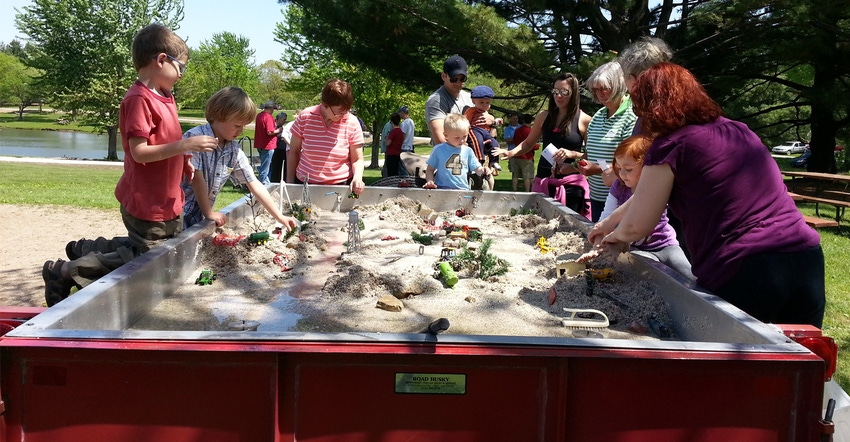April 12, 2019

Iowa Learning Farms, housed at Iowa State University, celebrates 15 years of service in 2019. Established in 2004, ILF is building a “culture of conservation” by encouraging adoption of conservation practices.
Farmers, researchers and ILF team members work together to identify and implement best management practices to improve water quality and soil health while remaining profitable.
Throughout 2019, ILF will be sharing stories about the contributors, history and successes of ILF and its partner program Water Rocks!
Elaine Ilvess
Elaine Ilvess is now retired as a longtime program planner for the Water Resources Bureau at the Iowa Department of Agriculture and Land Stewardship. She also served as an assistant commissioner for the Polk County Soil and Water Conservation District.
Ilvess was a part of the Iowa Learning Farms story from the outset. In her role with IDALS, she was involved in seeking new ways to communicate to and educate the public about water quality and conservation. She played an active role in creating ILF, and continued to consult and advise ILF up through her retirement in 2010.
What has been your role with Iowa Learning Farms? I was involved in ILF before the foundation was poured and the ground floor existed. Being a part of the planning team and drawing on my career in water quality and conservation outreach, I was eager to help create something new for Iowa that could move awareness about these important topics forward.
Once ILF was up and running, I served on the technical committee. In addition, I played a crucial role in managing funding, monitoring expenditures and coordinating with other funding partner agencies to ensure compliance and help keep the program on track.
How did you change the program, and how did it change you? It may not have been so much of a change as contributing to the formation and mission of ILF from the beginning. In the early 2000s, there were new funds available for new approaches to water quality education and outreach. I was instrumental in developing the ILF concept of a culture of conservation, spreading information to farmers through hands-on demonstrations that would facilitate farmer-to-farmer engagement.
ILF’s foundation was derived from working with experts at Iowa State University and conservation specialists throughout Iowa who brought fresh and innovative approaches and ideas to create the statewide program.
Being a part of ILF gave me the opportunity to learn from and work with some of the masters, including governors, ag leaders, forward-looking scientists and researchers, environmentalists, and the strongest advocates for conservation and water quality. It also led me to become a champion of continued funding and support for programs such as ILF. Programs that learn from farmers and peer groups, and that imbue the concepts of “Information, Education and Demonstration.”
What are your fondest memories of working with ILF? The conversations and interactions at field days. My own conversations, but also observing the engagements between the ISU professionals with farmers — listening, advising and working together. I also loved watching Iowa’s youth as they strengthened their knowledge and commitment to conservation.
Why are water quality and conservation outreach important to you and to Iowa? Growing up on a farm, I learned the value of conservation at a young age through living within the farm and natural ecosystems and observing firsthand impacts.
As I pursued my career, I committed myself to helping others identify what they need and finding the resources and information which enable them to conscientiously derive value from their work. I also pursue this in my personal life through consistently offering information and education to people ranging from friends and neighbors to my own grandchildren.
Our environment, soil and water are the basis of our existence, as well as Iowa’s economy and livelihood. It’s critical that we improve and preserve these resources for current and future generations.
If you could look 15 years into the future, what one thing would you like to see as a result of ILF activities? I would like to see that the results of programs such as ILF have proven their significant worth to Iowa, leading to more secure funding. This would empower further expansion of outreach and education programs delivering information relevant to farmers and nonfarmers alike. In addition, establishing youth conservation education as an integral part of school curricula would be a wonderful step forward for Iowa and the nation.
What else should people know about Iowa Learning Farms? One thing people should know about ILF is that a small yet powerful program like ILF can have a big impact. The way ILF delivers information and facilitates conversations has had a multiplying affect, which has been going on for 15 years. Starting out with small numbers and a few field days to thousands of Iowans becoming aware of what conservation means and how each individual — everyone — plays an integral role has been a laudable achievement that can continue to contribute to Iowa’s future.
Source: ILF, which is responsible for the information provided and is wholly owned by the source. Informa Business Media and its subsidiaries aren’t responsible for any of the content contained in this information asset.
You May Also Like




